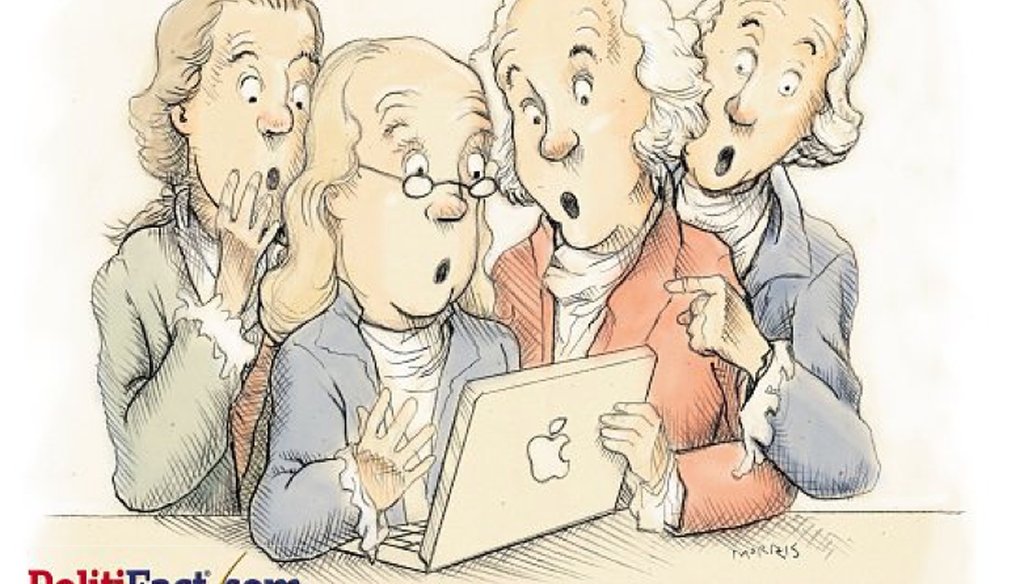Stand up for the facts!
Our only agenda is to publish the truth so you can be an informed participant in democracy.
We need your help.
I would like to contribute

Tampa Bay Times Illustration by Don Morris.
Invoking the Founding Fathers on Independence Day to celebrate our nation’s birth is a fine thing to do.
Invoking them to score political points? Watch out.
Take, for example, a Facebook post about Benjamin Franklin that circulated in May, a post that was actually aimed at making fun of tea party favorite Rep. Michele Bachmann, R-Minn. The meme quotes Bachmann as saying, "This country could use a president like Benjamin Franklin again." Of course, Franklin was never president. And we think Bachmann knows that, as well, because she never actually said the quote. We rated the fabricated Facebook meme Pants on Fire.
It’s not just claims on social media. Pundits and politicians get things wrong time and time again when they use the Founding Fathers to support their political views. Over the years, PolitiFact has found numerous errors about what the Founding Fathers supposedly said or did, especially when it comes to constitutional issues and civil rights.
Talking about the First Amendment, radio host Bryan Fischer of American Family Radio said that "by the word ‘religion’ in the First Amendment, the founders meant Christianity."
Our research and interviews with historians showed that the Founding Fathers pretty clearly meant all religion. For example, we found that both Benjamin Franklin and John Adams referred to Islam when discussing religious freedom, typically referring to Muslims as Mahometans. We rated the claim Pants on Fire.
On the other side of the political aisle, Keith Olbermann -- at the time a commentator on the liberal network MSNBC -- said that Adams as president signed the Treaty of Tripoli as an "outreach to Muslims." That claim went too far. Olbermann downplayed the overriding purpose: to protect American ships from pirates that happened to be Muslim. We rated his statement Half True.
On the Second Amendment, we’ve looked into comments from U.S. Rep. Louie Gohmert, R-Texas, about George Washington. According to Gohmert, Washington said that a free people "should be an armed people. It ensures against the tyranny of the government." We rated that claim False, because Washington was actually talking about developing a militia to protect the new nation -- on behalf of the government, not against it.
Quite a few people have made claims about Washington’s commitment to Christianity. Talk show host Rush Limbaugh, for example, said, "You can't read a speech by George Washington … without hearing him reference God." In fact, several of his important speeches -- such as his second inaugural address and annual message to Congress -- didn’t mention God. We rated Limbaugh’s statement False.
In fact, Washington was not a particularly devout Christian. Rep. Duncan Hunter, R-Calif., once got a False from PolitiFact for saying, "Our first president and our first commander in chief prayed every day. He had a field manual of prayers." Scholars say Washington was more of a deist than a Christian, and the book of prayers’ connection to Washington has been debunked.
We’ve also seen the Founding Fathers portrayed as fervent champions of the free market. In November 2010, Florida Gov.-elect Rick Scott said complaints about government regulations are "so old that Thomas Jefferson listed this problem among his charges against the King of England in the Declaration of Independence." Scott correctly quoted Jefferson, but we found that Jefferson’s grievances in this case were directed at King George’s interference in the colonies, rather than government regulation in general. We rated that claim Half True.
The Declaration of Independence was adopted on July 4, 1776, but at least one former presidential candidate got it mixed up with the Constitution. Herman Cain said that "life, liberty and the pursuit of happiness" and "the right of the people to alter or abolish (the government)" were part of the Constitution. Both clauses are in the Declaration of Independence. We rated his statement False.
Other have claimed that President Barack Obama misquoted the Declaration of Independence. A political action committee called The Government is Not Good put out an advertisement that said Obama was the "only president in history who has deliberately removed the words ‘endowed by their Creator’ when referring to the Declaration of Independence." However, Obama has used the phrase multiple times, and we found that former President Ronald Reagan left it out sometimes, too. We rated that claim False.
When PolitiFact named Obama’s claim that "if you like your health care plan, you can keep it" the Lie of the Year for 2013, a reader tweeted: " ‘Half a truth is often a great lie.’ - Benjamin Franklin." The reader accurately quoted Franklin, whose sayings on truth don’t end there. In his iconic text Poor Richard’s Almanack, Franklin also said, "A lie stands on one leg, a truth on two," and, "When the wine enters, out goes the truth."
Our Sources
See PolitiFact items.
















































